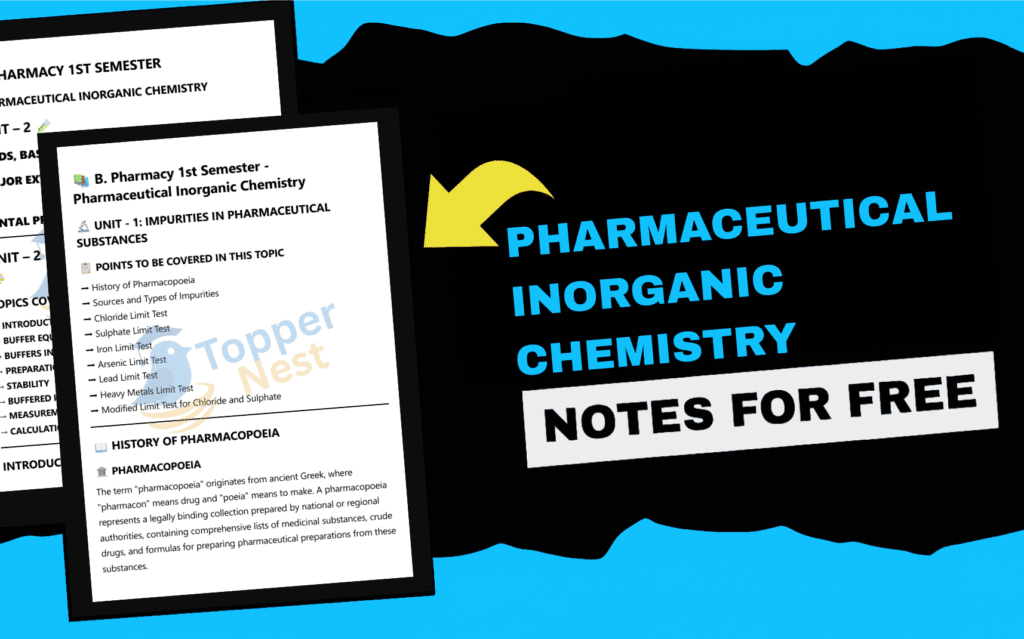Starting your B. Pharmacy journey? One of the first and most important subjects you’ll encounter is Pharmaceutical Inorganic Chemistry (PIC). This subject lays the foundation for understanding the role of inorganic compounds in pharmacy from medicinal uses to their chemical properties, preparation, and quality control.
Our Pharmaceutical Inorganic Chemistry Notes are designed to make your learning simple, structured, and exam-focused. Whether you’re looking to revise key topics like pharmaceutical acids, bases, buffers, isotopes, essential elements or limit tests, these notes will help you grasp concepts quickly and remember them effectively.

What is Pharmaceutical Inorganic Chemistry?
Pharmaceutical Inorganic Chemistry is the branch of chemistry that studies the preparation, properties, and applications of inorganic compounds in the field of pharmacy. It focuses on non-carbon-based compounds, which are used as therapeutic agents, diagnostic tools, and pharmaceutical aids.
The key aspects of pharmaceutical inorganic chemistry include:
- Therapeutic agents: This includes inorganic compounds used to treat diseases, such as metal-based drugs for cancer, or those used to correct electrolyte imbalances in the body (e.g., sodium chloride, potassium chloride).
- Pharmaceutical aids: These are inorganic substances that are not the primary active ingredient but help in the preparation or function of a drug. Examples include talc as a dusting powder and various antacids.
- Diagnostics: This area involves the use of inorganic compounds, often in the form of radiopharmaceuticals, for medical imaging and diagnostic purposes.
- Purity and Quality Control: A major component of this field is the study of methods to ensure the purity and quality of inorganic pharmaceutical products. This includes conducting “limit tests” to detect and quantify trace impurities like heavy metals, chlorides, or sulfates.
Unit-wise Notes for Pharmaceutical Inorganic Chemistry
Why Pharmaceutical Inorganic Chemistry is Important in B. Pharmacy
Pharmaceutical Inorganic Chemistry is a fundamental subject in the B. Pharmacy curriculum for several reasons:
- Foundation for Drug Knowledge: It provides the basic understanding of inorganic compounds, which are essential components of many drugs and pharmaceutical preparations. This includes knowledge of their chemical properties, structures, and how they interact with biological systems.
- Understanding Medicinal Applications: The course helps students learn about the therapeutic uses of inorganic compounds. This includes their roles as antacids (e.g., aluminum hydroxide), antimicrobials (e.g., silver nitrate), electrolytes (e.g., sodium chloride), and diagnostic agents (e.g., radiopharmaceuticals).
- Quality Control and Purity: A significant part of the curriculum focuses on quality control. Students learn to identify sources of impurities in drugs and perform “limit tests” to ensure the safety and purity of inorganic substances, which is a critical skill for a pharmacist.
- Role in Formulations: Inorganic compounds are also used as pharmaceutical aids in drug formulation, such as talc and bentonite. The course provides knowledge on how these compounds contribute to the stability and effectiveness of various dosage forms.
- Development of Novel Therapies: It introduces students to advanced topics like metal-based drugs (e.g., cisplatin for cancer) and chelation therapy for metal poisoning, which highlights the role of inorganic chemistry in developing innovative treatments.
Benefits of Our Pharmaceutical Inorganic Chemistry Notes
Looking for a reliable study resource to excel in Pharmaceutical Inorganic Chemistry during your B. Pharmacy course? Our professionally curated notes at Toppernest.com are designed to help you understand inorganic chemistry concepts, pharmaceutical applications, and quality control methods with ease and confidence.
Frequently Asked Questions (FAQs)
1. What is Pharmaceutical Inorganic Chemistry?
Answer: Pharmaceutical Inorganic Chemistry is a branch of chemistry that studies inorganic compounds and their applications in pharmacy, including medicinal uses, preparation, properties, and quality control.
2. Are these notes suitable for B.Pharm 1st semester students?
Answer: Yes. These notes are designed specifically for B.Pharm 1st semester students, following the syllabus of most Indian universities and pharmacy colleges.
3. Can I download these notes as a PDF?
Answer: Yes. We provide PDF versions for easy offline access and exam preparation.
4. Are these notes helpful for exam preparation?
Answer: Absolutely. The notes are structured in a concise, easy-to-understand format to help you quickly revise important concepts before exams.
5. Do the notes include previous year questions?
Answer: Some versions of the notes include important questions and previous year exam patterns to aid in better preparation.
